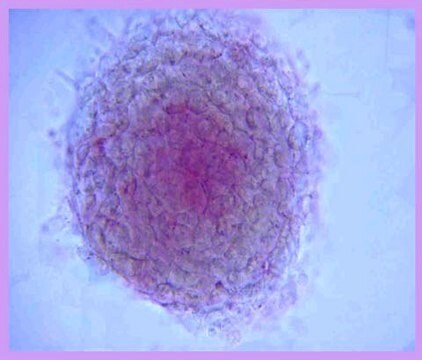AP0100
Alkaline Phosphatase Diethanolamine Activity Kit
sufficient for 100 tests
Synonym(s):
ALP Activity Kit
Sign Into View Organizational & Contract Pricing
All Photos(1)
About This Item
UNSPSC Code:
12352202
NACRES:
NA.26
Recommended Products
usage
sufficient for 100 tests
storage temp.
2-8°C
General description
The Alkaline Phosphatase Diethanolamine Detection Kit provides ready-to-use reagents for detecting the presence of alkaline phosphatase activity. This simple assay to detect alkaline phosphatase activity uses p-Nitrophenyl Phosphate (pNPP) as the substrate.
Application
Alkaline Phosphatase Diethanolamine Activity Kit has been used:
- in the detection of alkaline phosphatase (ALP) levels in the blood serum and osteoblasts
- for monitoring ALP levels during osteoblast differentiation in mouse myoblast C2C12 cells
- for determining ALP activity in the bone metastasis model of lung cancer
- for measuring ALP levels in colon tissue homogenates
Suitability
Suitable for the measurement of alkaline phosphatase activity in a variety of samples
Principle
Alkaline phosphatase hydrolyzes pNPP to p-nitrophenol and inorganic phosphate. During incubation of the alkaline phosphatase sample and substrate at 37 C, the reaction is followed by monitoring the increase in absorbance at 405 nm.
Signal Word
Danger
Hazard Statements
Precautionary Statements
Hazard Classifications
Eye Dam. 1 - Repr. 2 - Skin Irrit. 2 - STOT RE 2 Oral
Target Organs
Kidney,Liver,Blood
Storage Class Code
10 - Combustible liquids
WGK
WGK 3
Flash Point(F)
Not applicable
Flash Point(C)
Not applicable
Certificates of Analysis (COA)
Search for Certificates of Analysis (COA) by entering the products Lot/Batch Number. Lot and Batch Numbers can be found on a product’s label following the words ‘Lot’ or ‘Batch’.
Already Own This Product?
Find documentation for the products that you have recently purchased in the Document Library.
Customers Also Viewed
XiaoQing Lu et al.
Medical science monitor : international medical journal of experimental and clinical research, 25, 9524-9530 (2019-12-14)
BACKGROUND Angiopoietin-like proteins (ANGPTL) are a family of secretory glycoproteins that are involved in many pathophysiological processes. ANGPTL7 is a newly-discovered member of the ANGPTL family and plays a role in corneal morphogenesis, angiogenesis, glaucoma, and cancer. To date, whether
11beta-hydroxysteroid dehydrogenases as targets in the treatment of steroid-associated femoral head necrosis using antler extract
Pu R and Peng H
Experimental and Therapeutic Medicine, 15(1), 977-984 (2018)
Tumor targeting with docosahexaenoic acid-conjugated docetaxel for inhibiting lung cancer metastasis to bone
Jiang S, et al.
Oncology Letters, 16(3), 2911-2920 (2018)
MicroRNA-150 Modulates Adipogenic Differentiation of Adipose-Derived Stem Cells by Targeting Notch3.
Xiang Li et al.
Stem cells international, 2019, 2743047-2743047 (2019-11-30)
MicroRNAs (miRNAs) influence stem cell functions, including mobilization, proliferation, and differentiation. miR-150 is abundantly expressed in monocytes. Knockdown of miR-150 promotes bone marrow stem cell migration. The role of miR-150 in adipose-derived stem cells (ADSCs) is unclear. In this study
Ribusurong Pu et al.
Experimental and therapeutic medicine, 15(1), 977-984 (2018-02-13)
The aim of the present study was to investigate the therapeutic effect of deer antler extract on avascular necrosis of the femoral head (ANFH) induced by steroids, and to confirm that 11β-hydroxysteroid dehydrogenases (11β-HSD) are one of the targets of
Our team of scientists has experience in all areas of research including Life Science, Material Science, Chemical Synthesis, Chromatography, Analytical and many others.
Contact Technical Service










